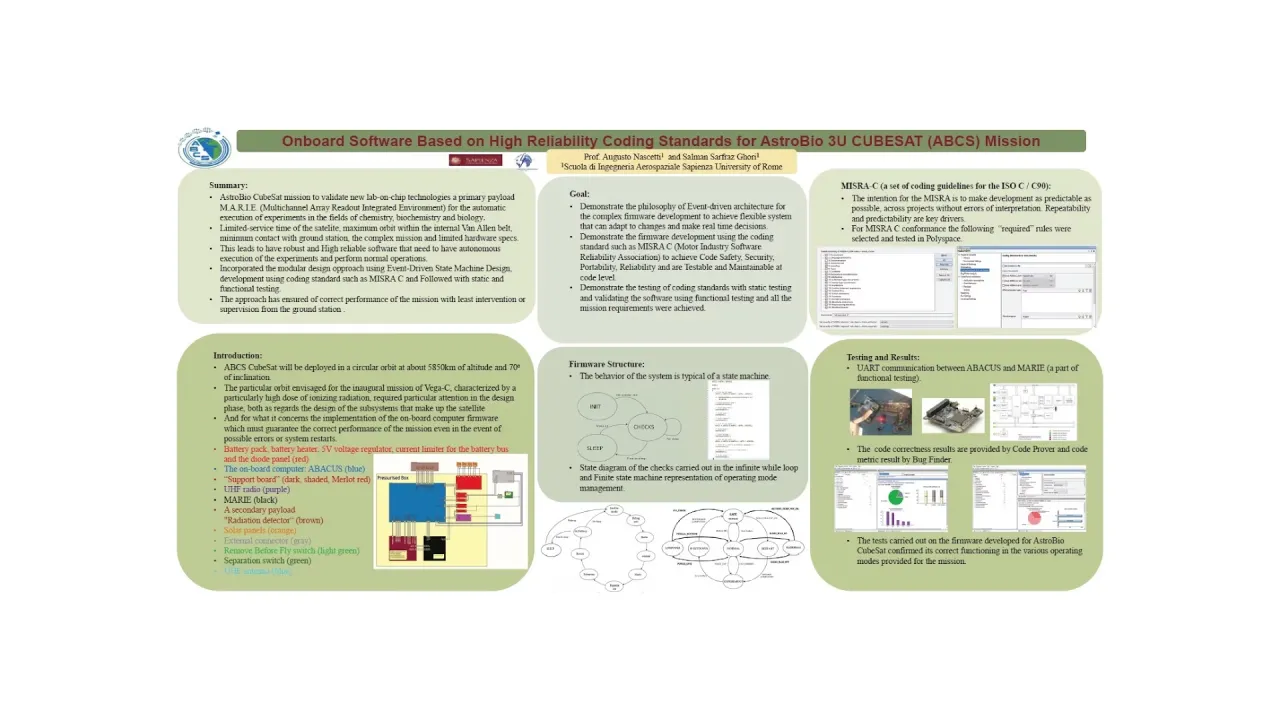
Salman Ghori: Onboard Software Based on High Reliability Coding Standards for AstroBio 3U CUBESAT (ABCS) Mission
KAUST Library
Overview
Onboard Software Based on High Reliability Coding Standards for AstroBio 3U CUBESAT (ABCS) Mission
Abstract
The work focuses on the development and testing of firmware for the onboard computer of AstroBio CubeSat, a satellite that will be put into orbit on the occasion of the inaugural flight of the Vega-C launcher. This satellite will be used to validate new lab-on-chip technologies for the automatic execution of experiments in the fields of chemistry, biochemistry and biology. The particular orbit envisaged for the inaugural mission of Vega-C, characterized by a particularly high dose of ionizing radiation, required particular attention in the design phase, both as regards the design of the subsystems that make up the satellite, and for what it concerns the implementation of the on-board computer firmware which must guarantee the correct performance of the mission even in the event of possible errors or system restarts.
The firmware in addition to managing the normal operations of a satellite on-board computer, such as telemetry and remote controls, was developed to command and control the autonomous and automatic execution of bio-analytical experiments implemented on a highly integrated innovative lab-on-chip platform that represents the main payload of the mission. Also, the firmware will manage a secondary payload relating to the monitoring of radiation doses from the space environment.
The firmware, designed and developed with a modular approach, has been tested in every part and its highly flexible architecture allows it to be used on other satellites for scientific missions that require the autonomous and automatic management of long-term experiments with a relatively low sampling frequency such as those related to the detection of chemical reactions associated with biological processes. In particular, the autonomous management of the experiments eliminates the need for interaction with the ground station during their execution, allowing the acquisition of scientific data during the entire orbit and not only in the satellite visibility phases, which can be used for data download. Furthermore, the design of this firmware guarantees control over the data sent and received by satellite and reliability offered by Coding Standard MISRA C for both the control of operations at the payload level and of the various on-board subsystems. The tests carried out on the firmware developed for AstroBio CubeSat confirmed its correct functioning in the various operating modes provided for the mission
Brief Biography
I am from Hyderabad, India. I have completed my Masters in Aerospace Engineering from Scuola di Ingegneria Aerospaziale, Sapienza Università di Roma and have Bachelor of Technology in Electronics and Communication Engg from Jawaharlal Nehru Technological University Hyderabad. I worked as senior engineer for 5 years in Automotive Sector. Currently working as PhD student in KAUST.